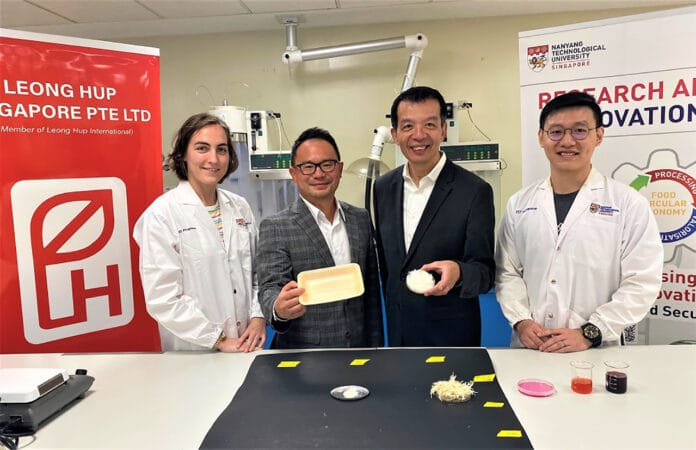Waste material from a poultry farm, especially chicken feathers, is going to be a big concern for a clean environment as the quantity is mounting day by day. Billions of unwanted chicken feathers are thrown out annually from poultry process plants. Just discarding chicken feathers are neither cost-effective nor eco-friendly.
Now, researchers at Nanyang Technological University, Singapore (NTU Singapore) and poultry producer Leong Hup Singapore Pte Ltd. have jointly developed processes to repurpose waste materials from poultry farming. The techniques are used to create two different products – meat storage trays and a cell culture medium that could be used to produce lab-grown meat.
In the process, chicken feathers were thoroughly washed with distilled water and detergent to remove different sorts of contaminants such as bloodstains, oil, and grease from the surface. These feather fibers were then dried at room temperature (27°C) for four days and cut by a crushing machine. The chicken feather fibers and unsaturated polyester resin were mixed and placed inside glass molds and kept in a fume hood for one day.
The resulting feather fibers, combined with an unsaturated polymer resin, are then used as a material for egg trays, serving as a biodegradable replacement for synthetic polymers, whose production, use, and disposal cause greenhouse gas emissions, as they are made from petroleum oil. In laboratory tests, the materials that used keratin from chicken feathers could withstand nearly two times of force exerted on them compared to conventional plastic trays used to contain chicken meat.
As the organic waste from poultry processing includes blood, gristle, skin, and bone, it contains amino acids, vitamins, glucose, inorganic salts, and growth factors, which are ideal for cell culture mediums to cultivate cell-based meats. The NYU scientists have also managed to effectively extract those nutrients and develop a solution that has the potential to grow animal cells for lab-grown meat.
In recent tests, they also showed that the serum derived from poultry blood and the biological matter has the potential to replace fetal bovine serum as a medium to cultivate cell-based meat, as it has similar concentrations of growth factors and other nutrients.
“The cultivation of lab-grown meat has the potential to reduce and even one day end the slaughter of farm animals, and the impact rearing farm animals has on the environment,” said Professor William Chen, Director of NTU’s Food Science and Technology Programme, co-lead of the industry collaboration. “But it is expensive, partly due to the high cost of the medium that is used to grow the meat. Our collaboration with Leong Hup Singapore sees us applying innovations developed by NTU’s Food Science and Technology Programme to address that problem, bringing down the price for the medium while repurposing materials that would otherwise have been discarded.”
Researchers are currently testing the innovations in its Singapore plant and expect to implement the products it has developed with NTU in its overseas plants in Malaysia and Southeast Asia by 2023.
